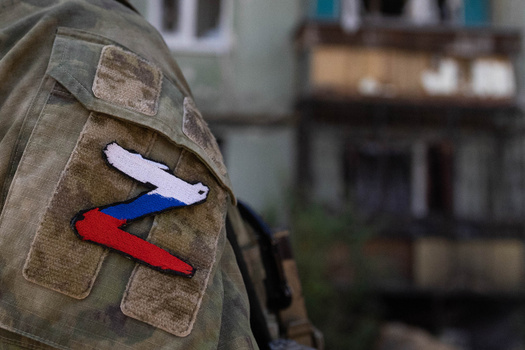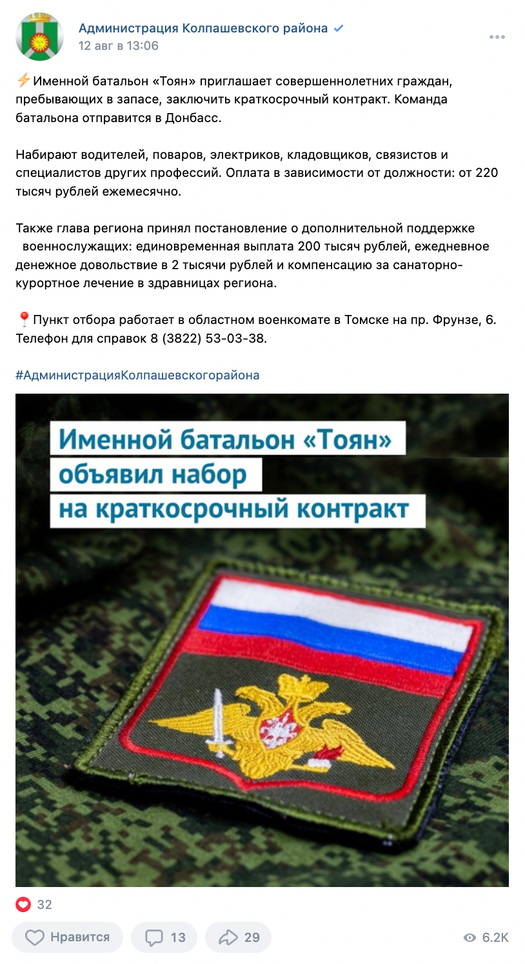
‘You’ll be fully fed over there’ Russia’s regions are forming volunteer battalions. Meduza obtained an audio recording of one military official’s recruitment pitch.
Мы рассказываем честно не только про войну. Скачайте приложение.
For several months now, Russian regions have been forming their own volunteer battalions to generate more troops for the war against Ukraine. Back in July, Meduza reported on the formation of “Sobyanin’s Regiment,” a company named after Moscow’s mayor (who, incidentally, has tried to distance himself from the war). By early August, more than 20 Russian regions had reportedly formed more than 40 volunteer units. In the Tomsk region, recruitment for the “Toyan Battalion” is ongoing. In an effort to reel in volunteers, the heads of military commissariats have been visiting enterprises across the region, dangling financial incentives, family pensions, and guaranteed university admission for their children. Meduza has obtained an audio recording of one of these recruitment meetings.
On August 15, Ivan (name changed) reached out to Meduza and shared an audio recording of a local military commissar’s visit to his workplace in Seversk, a city on the outskirts of Tomsk. The military commissar, Sergey Mikov, told the enterprise’s employees that the Russian Defense Ministry had ordered the recruitment of residents of the Tomsk region for a new volunteer unit called the “Toyan Battalion.”
The Seversk military commissar said that the Toyan Battalion was offering six-month contracts — and he repeatedly emphasized that joining up is voluntary. “This battalion’s task is logistic support,” Mikov explained. “We’re recruiting cooks, welders, electricians, drivers, bath and laundry service staff, and so on. There are actually a lot of positions, but they all have to do with logistics.”
As follows from the recording, Mikov then proceeded to list a variety of financial incentives. The amount of money promised to contract soldiers, he said, is based on the military allowance prescribed by their position and rank, plus bonuses. According to Mikov the Tomsk region’s acting Governor Vladimir Mazur had recently ordered the allocation of an additional 560,000 rubles ($9,000) to each volunteer, as a bonus for six months of service.
“The total amount from the Defense Ministry and the governor is approximately 220,000 rubles [$3,600] per month,” the military commissar said. The Tomsk regional administration did not respond to Meduza’s questions about Mikov’s claims.
According to Mikov, the Toyan Battalion will take part in combat operations in Ukraine as a full-fledged military unit. “But again I repeat, as we have said already, it’s a logistics support [unit].”
After serving out their contracts, volunteers will receive veteran’s status and all of the legally required benefits that come with it. As an example, Mikov cited lifetime pensions, annual health resort treatment for combat veterans and their families, and guaranteed enrollment in state-funded universities for their children.
Men between the ages of 18 and 60 are eligible to enlist in the battalion, so long as they aren’t exempt from military service for medical reasons. Volunteers will also be able to undergo a military-medical examination free of charge, Mikov stressed twice.
The military commissar then said that joining the volunteer unit would be especially “attractive” to those who failed to complete their military service — including anyone who had their contract terminated by the Defense Ministry or the National Guard for one reason or another. Candidates with expunged criminal records would be considered as well, Mikov assured.
Upon completing their six months of service, volunteers will be able to return to their current jobs; “This issue has been resolved” with the heads of enterprises in the region, Mikov said. However, those who so desire will also be able to continue their military service.
“The battalion is being formed right now, very quickly. Recruitment will be stopped in about a week, maybe 10 days. Because the candidates are coming. Recruitment is proceeding quickly, rapidly,” the military commissar concluded.
After completing his pitch, Mikov fielded questions from the company’s employees.
“Did I understand correctly that there won’t be any training?” one person asked.
“No, training is underway — at present it’s called ‘[combat] coordination.’ [It will last] for at least two weeks. A contract serviceman is ensured a uniform, kit, familiarization with military equipment, weaponry, and the facilities where service will take place,” the military commissar replied.
Mikov was then asked if those who didn’t serve in the army and people with criminal records could enlist. The military commissar explained that the draft board would consider each case “on an individual basis.”
“[What payments are stipulated in the contract] in the event of injury or death?” someone asked.
“In the event of injury, everything is [as required] for a serviceman under contract: both an insurance payment and a lump-sum payment. The total payments come to about 5–10 million [rubles, or $83,000–$165,000]. If the family of the serviceman has multiple children, there are cases in our region where the payment amounted to 15 million rubles [$248,000],” Mikov replied.
“And in the event of death?”
“Five million [rubles, or $83,000] as a lump-sum [payment] from the president, an insurance [payment] of about 3.9 million [rubles, or $64,500], and a lump-sum [payment] that’s also about 3 million [rubles, or $47,000]. Plus, all family members are given a lifetime pension. With the exception of children: [pensions are paid] to them up to the age of 18 or up to 23, if they study full-time.”
Faced with questions about how to deal with loan payments, Mikov seemed less confident and tried to shift the conversation to the topic of monthly wages. “A serviceman under contract receives his military allowance on the tenth [day] of each month. And [he receives a bonus] from the governor [of the Tomsk region]: [if] he serves a month, he gets a sixth of the prescribed 560,000 [rubles].”
Upon being reminded that it’s impossible to make loan payments while in a war zone, Mikov advised the workers to leave their bank cards with their wives. “You’ll be fully fed over there [in Ukraine],” he quipped.
Mikov also gave a “100 percent” guarantee that the Toyan Battalion would be deployed in the rear and that volunteers wouldn’t be sent to the front line — this, he said, is written in the contract.
The military commissar also mentioned that the neighboring Novosibirsk region is forming its own special forces battalion: “But you can’t join [it], unfortunately, because you were born in Tomsk.”
Mikov ended the discussion shortly thereafter, advising the workers to direct any further questions to the military commissariat by calling the phone number on the leaflets available in the HR department. Photos of the leaflets obtained by Meduza show that one of them includes the slogan “Take your place in the ranks.”

* * *
“The military commissar was noticeably nervous,” Ivan, the source of the audio recording, told Meduza. “And the people in the hall mostly stayed silent. They’ve been successfully zombified by TV propagandists.” Ivan made no secret of his anti-war stance: “I [stopped] saying hello to half of my colleagues after the start of the war. I think they consider me a traitor. But I physically can’t talk to those who justify a fratricidal war.”
Ivan also said that one of his colleagues confided in him that he would like to join the Toyan Battalion, but couldn’t because of his children. “Generally speaking, people only support the war when sitting on the couch. When it’s a matter of helping with money or being sent to the front line, all the enthusiasm disappears,” Meduza’s source said. Ivan doubted that the recruitment effort was going as well as Sergey Mikov claimed.
The Military Commissariat of the Tomsk Region did not respond to Meduza’s request for comment prior to publication.
Story by Meduza. Abridged translation by Eilish Hart.
(1) Prince Toyan
Toyan was the prince of the Eushta Tatars, a tribe that lived on the banks of Siberia’s Tom River in the late 16th and early 17th centuries.